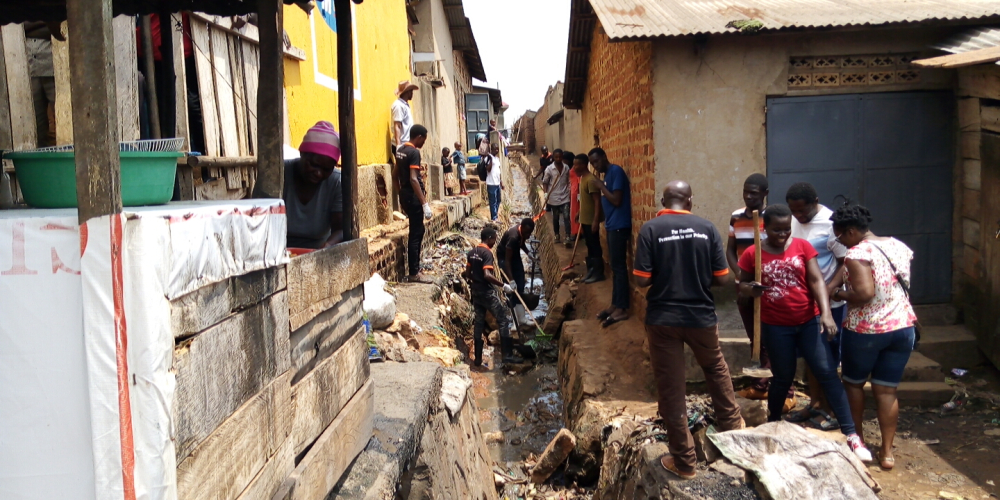
Photo Caption: Community Clean up on September 7, 2019 at Kifumbira Slum and Market.
|
O |
n 26th September 2020, students of Makerere University School of Public Health (MakSPH), under their umbrella organization Makerere University Environmental Health Students' Association (MUEHSA), joined the International Federation of Environmental Health and the rest of the world in commemorating World Environmental Health Day 2020. To mark this important day, MUEHSA organized a Zoom seminar aimed at raising awareness under the theme: Environmental Health, a key public health intervention in disease pandemic prevention. This event attracted participants from all over Africa including South Africa, Zimbabwe, Kenya, Nigeria and Rwanda.
In Uganda, the participants ranged from Environmental Health practitioners, policy makers, researchers, local communities, alumni, and students from different higher education institutions including Makerere University, Cavendish University, Victoria University, Mountains of the Moon, Mbarara University of Science and Technology, Uganda Institute of Allied Health and Management Sciences (formerly Mulago Paramedical School), and Mbale School of Hygiene among others.
Speaking at the online seminar, MSPH's Dr. David Musoke, who is also the Secretary of the International Federation of Environmental Health (IFEH) Africa Group, was a guest speaker and shared about the role of environmental health practitioners in the response to pandemics from a global perspective, before reminding the participants of their key responsibility in the prevention and control of the COVID-19 pandemic. Despite COVID-19 having affected environmental health training globally, Dr. Musoke noted that Makerere University remains committed to creating a safe learning environment for its students as the institution plans to officially reopen soon. As a result, he noted that the university is implementing infection prevention and control strategies to curb the spread of the virus, and also adopt a blended learning model including e-learning as a new normal.
Another guest speaker Mr. David Ssemwanga, Senior Environmental Health Officer currently serving as the Technical Assistant with Uganda Sanitation Fund (USF) at the Ministry of Health (MOH) highlighted the concept of epidemiological disease triad and the importance of prevention in disease pandemic response. He also recognized the active involvement of environmental health practitioners in Uganda during COVID-19 interventions both at national and local levels stating that they have been involved in the task force in enforcement of water, sanitation and hygiene (WASH) practices, observance of standard operating procedures ( SOPs), disease surveillance, sensitization, mobilization, and contact tracing which are all important aspects in the control and prevention of the pandemic.
Mrs. Hajra Comfort Mukasa, a public health specialist and a WASH Programme Manager at AMREF Health Africa emphasized the importance of sustainability in ensuring availability and management of water and sanitation. She also revealed that Amref is always willing to take up interns in the field of WASH and therefore advised that those interested to take letters from their institutions (once the internship advert runs) to facilitate getting placement with the organization. On a special note, Ms. Hajra also shared about her latest innovation dubbed "Sanitation Digital Solutions Systems (SaniDigs) that brings hygiene stakeholders and beneficiaries together by a click of a button.
In her remarks, Ms. Ikol Rachael, the MUEHSA President said that the aspect of sustainability especially when it comes to soap for hand hygiene remains a challenge. To counter the concern, she invented a handwashing material known as ASH GEL which is locally made from fine sieved ash and water (with soaked lemon or orange peels to provide a good scent to the final product). ‘This product will help communities improve further their handwashing behavior as they will not need to spare money to purchase soap.’ Ms Ikol explained.
To crown off the Zoom seminar, Ms. Ikol thanked the Dean MakSPH Prof. Rhoda Wanyenze, Ministry of Health, AMREF Health Africa, MUEHSA Patron Mrs. Ruth Mubeezi Nebye, the IFEH Africa Group, and the Department of Disease Control and Environmental Health Chaired by Assoc. Prof. Esther Buregyeya for the unending support to MUEHSA. She equally thanked the participants for taking time to celebrate World Environmental Health day with MUEHSA.
Written by Joseph Odoi

